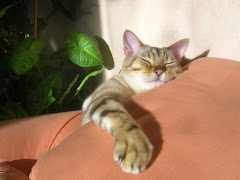 Tell me, do you know the meaning of the word 'koan'?
Tell me, do you know the meaning of the word 'koan'? I didn't . . . not until yesterday. Then, whilst listening to a radio programme, I was intrigued to discover that it's the name for an unanswerable question.
The well-known Zen question: "What is the sound of one hand clapping?" is the perfect example.
It's a question that, as it has no answer, defeats reasoning. In defeating reasoning it checks the over-active mind and, out of total bafflement, a 'koan' produces a wholly beneficial calm.
Thinking about this, it struck me that surely this is something we all need . . . not questions and answers, but mind-stilling, beneficial 'koans'.
 Wouldn't you agree that we are all of us addicted to our need for answers? Not only that, we are equally addicted to our need for precision . . . and certainty . . . and control.
Wouldn't you agree that we are all of us addicted to our need for answers? Not only that, we are equally addicted to our need for precision . . . and certainty . . . and control.Only this week I heard that a special committee at the United Nations will shortly make what was called an important decision. This important decision concerns whether or not it will keep adding an extra second to our atomic clocks. Apparently, this adjustment is made every couple of years to keep the clocks accurate.
One second every two years . . . ? Is such an adjustment so critical to our international wellbeing that it warrants the United Nations convening a special committee?
As time is governed by the rotation of the planet, let's concede that our clocks might need the occasional tweak.
But surely man-made weights and measures are entirely within our control . . . or are they?
 You probably know that the original prototype of the kilogram, a prototype that dictates the standard weight for the entire world, is kept securely locked away in a Paris vault.
You probably know that the original prototype of the kilogram, a prototype that dictates the standard weight for the entire world, is kept securely locked away in a Paris vault.What you may not know is that there's a rumour in circulation. This rumour claims that, through ageing, that original prototype has lost a noticeable fragment of its original weight.
So, what is a kilogram?
Is it the weight that was originally recorded . . . the current weight of the purportedly shrinking prototype . . . or, fascinating thought, has the weight of the kilogram become a moveable feast?
Now . . . isn't that a perfect 'koan'?

If time and weights can prove variable, what about that other trusted yardstick, what about measures?
Here, too, things are not as simple as they may seem. Until recent times it appears that a French 'foot' was considerably longer than a British 'foot' Hence the misconception that Napoleon was short when, in fact, his measurements had been taken using a French tape measure and mis-translated when crossing The Channel!
When we, and the rest of creation, are in a constant state of evolution, isn't it a little strange that we should suffer this craving for a constant precision in our lives?
Nothing remains the same. Nothing has ever remained the same . . . not even us.
We wake up each morning to find ourselves inhabiting slightly different bodies from the ones we took to bed the night before. Overnight our cells have been renewing themselves.
In the wider world, a sunset is never repeated . . . no two snowflakes are alike.
 Could it be that we are fearful of where we stand in this uncertain, evolving creation? That we need to create reassuring, fixed facts to offer ourselves the illusion of security, to provide a false sense of permanence and importance?
Could it be that we are fearful of where we stand in this uncertain, evolving creation? That we need to create reassuring, fixed facts to offer ourselves the illusion of security, to provide a false sense of permanence and importance?Let's be brave . . . let's throw away our facts and statistics and settle for the benefits of a liberating 'koan'
What about: "Who is it watching me thinking these thoughts . . . ?"
Surely that's a 'koan' to last a lifetime!











